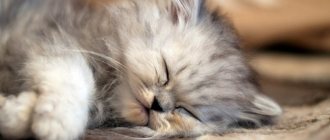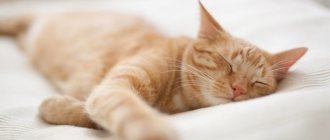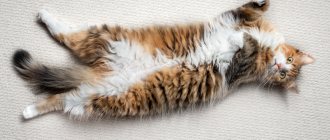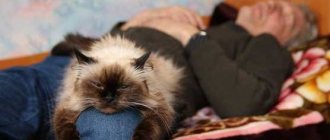Save the article:
No matter how hard a person tries to sleep longer, worries, affairs and responsibilities always interfere with him. But there is little that can distract cats from their dreams: on average, 16 hours a day they cause the envy of their owners, namely, they sleep serenely. If you calculate how much cats sleep during their lives, it turns out that they give 70% to sleep, and spend the remaining 30% on getting more tired and going to sleep.
Playing, tracking down prey, mastering new heights on the street or in the apartment - everything uses up a lot of cat energy, which can only be replenished by long and deep sleep.
Sleep standards for domestic cats
Each cat’s sleep norm is different: not only does it depend on the individual characteristics of the animal, but also on the energy expended during the day. One day the animal may be very tired from a long walk on the street, and on another day it may lie for half a day looking out the window - therefore, the duration of sleepy hours on these days will be different.
The total time allotted for dreaming can vary from 14 to 22 hours. What does total time mean: the pussy does not sleep “from bell to bell”, but easily alternates periods of sleep and activity. The cat gets the missing time in the arms of the owner and in any cozy corner. Cats sleep lightly, so they are easily interrupted by any loud sound, and, as if nothing had happened, they remain awake for some time, in order to soon fall asleep again.
Sleep norms for newborn kittens are different - they constantly doze next to their mother, waking up only to feed. Gradually, their waking hours increase, but they sleep somewhat less than adults. Older cats relapse into childhood and dream again constantly, waking up to litter and feed.
How long do adult cats sleep?
global $ads_google;
//data-ad-slot=”2475549904″ $ads_google = empty($ads_google) ? false : true; ?> if ($ads_google == false) {?> $ads_google = true; ?> } ?> If you compare how much an adult cat and a tiny newborn kitten sleeps per day , the kids will win. But then the emphasis shifts - the older ones sleep for a long time, and the kittens spend a lot of time playing.
For a healthy, tired cat, it will not be a deviation from the norm if he sleeps 20 hours in one day: his body may require such a long hibernation.
If an adult animal, which is one of the record holders for sleep among mammals, suddenly sleeps little, it means that it is in a state of stress. If this problem continues, the cat may lose a lot of weight and become ill due to nervousness.
In general, a cat needs to sleep 12-14 hours a day, but the total amount of hours spent on this is sometimes difficult to determine precisely because of the frequent alternation of periods of dreaming and activity.
How long do kittens sleep?
A healthy kitten at a tender age will easily sleep 22 hours in one day. This is not a reason to worry, but a variant of the norm. Age plays a significant role: if newly born kittens immediately fall asleep after eating, then cats at the age of one or two months play for a long time next to their mother, study the world around them and are in no hurry to fall asleep. A mother cat often spends much more time sleeping than her curious children.
If an older kitten sleeps a lot, and in addition to this, he has poor appetite and low activity, then this is a reason to consult a veterinarian with suspected illness.
Is a cat always in deep sleep?
If you think your cat is always fast asleep, think again. After all, there's a reason they call it "napping."
According to the researchers, only about 25 percent of a cat's sleep is actually deep sleep, while the remaining 75 percent of the time they are lightly dozing.
Although they still get a lot of rest, they are still alert enough to wake up quickly. Again, this comes from their primal instincts.
To tell if a cat is just dozing, look to see if its eyes are open just a little, and also watch its ears. If their ears twitch and rotate in the direction of the noise, your kitten could come to life at any moment.
How long do cats sleep after anesthesia?
The behavior of pets and their condition after surgery always worries worried owners.
If a cat is about to be sterilized, then naturally the owner will be concerned about how much she will sleep after the operation. The body cannot ignore anesthesia, so after it and surgery it will take time to recover. Some creatures recover from anesthesia very quickly and wake up immediately, while others take longer.
If we are talking about a cat, then the question of how long he will sleep after castration also has an answer: it all depends on the individual characteristics of the pet’s body. In any case, he will need the care and attention of his owner. The veterinarian will definitely give important recommendations on this matter.
What to do if your pet sleeps too much
If long sleep does not fit into your pet’s daily routine, but he suddenly begins to rest for a long time, you should be wary and also take a closer look at his health. In addition to drowsiness, the disease is indicated by the presence of the following symptoms:
- increased water consumption or refusal of it;
- lack of appetite;
- lack of response to external stimuli;
- diarrhea;
- vomit;
- false urge to urinate.
The presence of at least one of the listed symptoms indicates the need to visit a specialist. If these symptoms are not present, it may be due to the weather: cats, like people, can be weather dependent and feel sleepy on certain days.
Sleep phases of cats
People who have cats in the house can constantly observe how a seemingly soundly sleeping pet suddenly jumps up and rushes at maximum speed to the kitchen, to the owner or to the door. For cats that have become well-adapted to resting during light naps, waking up abruptly is normal. These animals constantly pick up information from everywhere, so there is nothing strange in such a rapid succession of states.
Cat dreams are divided into two phases, which replace each other:
- slow phase: decreased blood pressure, low muscle activity, decreased heart rate, slow breathing. The eyes under closed eyelids, at the moment of falling asleep, slowly move a little and then stop
- fast phase: rapid heartbeat, change in breathing rate, rapid rotation of the eyes, slightly increased blood pressure and body temperature, possible shudders, movement of the limbs and ears.
The fast phase in adult cats takes up to 25% of the total time, in old cats 15%. The slow phase lasts 20-30 minutes, and then it is replaced by a fast phase for 5-7 minutes. Over a long period of sleep, the phases alternate several times.
When there is cause for concern
Should an owner worry if his pet sleeps too much or too little? Yes, there is cause for alarm if the following warning symptoms are present:
- Lack of appetite;
- Apathy while awake (the animal does not play, does not communicate with the owner, looks depressed);
- Poor condition of the coat (the fur is dull, brittle, falls out a lot, there may be bald patches on the animal’s body);
- Problems with bowel movements (constipation or diarrhea);
- Nausea and vomiting;
- Constantly hot, dry nose (crusts and sores on the nose are also a concern);
- Discharge from the nose or eyes, bad breath;
- Increase or decrease in body temperature;
- Jumps in blood pressure and pulse;
- Change in the usual shade of the mucous membranes (pallor, cyanosis, redness).
If the animal sleeps too much or too little, and at least some of the symptoms listed above are present, the owner urgently needs to show his mustachioed pet to a veterinarian. But if the cat is cheerful, active and eats well while awake, the owner most likely has nothing to worry about.
Do cats dream?
global $ads_google;
//data-ad-slot=”2475549904″ $ads_google = empty($ads_google) ? false : true; ?> if ($ads_google == false) {?> $ads_google = true; ?> } ?> How much time cats sleep per day has been determined, now it’s interesting to find out whether four-legged friends have dreams. Neuroscientists studied this issue and came to the conclusion that domestic cats are no strangers to dreams. This is usually something that has to do with the cat's lifestyle. This could be a battle with a wild relative, an active pursuit of prey, exploration of a new territory, or something associated with strong emotions.
Why doesn't the kitten sleep?
Sometimes the reason lies in increased excitability: the animal has been played with a lot, and due to active physical activity it is difficult for him to calm down and fall asleep.
Possible reasons why a kitten doesn't sleep enough:
1. Lack of food.
A newborn or already grown-up cat begins to meow or squeak pitifully: due to unsatisfied needs, he cannot fall asleep.
2. Health problems.
Diseases of the digestive tract and genitourinary system especially affect the daily routine. The animal is bothered by discomfort and pain, and it cannot fully rest.
3. Fleas, other parasites, skin infections.
Due to fungal diseases, allergies and insect bites, the cat sometimes meows plaintively and twitches its paws even in its sleep. Often, severe itching prevents the animal from falling asleep. The pet constantly itches and licks itself.
The animal sleeps less or more when weather conditions or room temperature change. Rainy weather affects pets in the same way as it affects humans: cats begin to stretch listlessly, yawn and doze. If the house is cold, the kitten becomes more active in order to warm up, or looks for a secluded place that is warmer and falls asleep - this is how it saves heat. When the apartment is too hot, the animal's sleep becomes more sensitive and superficial.
If your kitten's daily routine has changed significantly, you should consult a veterinarian. At a veterinary clinic, professionals examine the animal and, if pathology is detected, they will prescribe appropriate treatment. Sometimes you just need to adjust your diet by including the beneficial macro- and microelements necessary for development. But your pet's health problems can be much more serious.
How and when do cats sleep?
If a cat does not sleep at the required hours, being in a relaxed state, but looks for a secret place for dreams, it means that she is not so comfortable next to her owner. Normally, a cat would rather prefer the master's bed than the corner under the sofa. An animal that completely trusts its owner easily falls asleep on his lap, turning over on its back and putting all four paws in front of it.
When a cat is 9 years old, she slept for about 6 years of that time.
The place to sleep will most often be located at some elevation, and it will be something soft and warm. The cat will stomp on the chosen bed, stretch, relaxing every muscle, and very quickly falls asleep.
There are also originals among cats, which seem to be smeared with honey on the owner’s laptop, important documents on the table or freshly ironed linen.
Changing your sleep pattern: when to be wary
Sometimes a cat sleeps all day and starts playing at night, thereby disturbing people. Most predators are nocturnal animals, accustomed to being active in the dark. The most common domestic cat is a distant relative of tigers or panthers. They have similar habits, habits, and behavior patterns.
Material on the topic: everything about the Russian Blue cat breed.
In this case, it is worth adjusting your daily routine. This may take from a couple of days to several weeks. First of all, it is important to follow a diet. Try in every possible way to prevent your pet from sleeping during the day. Often they doze off because they are simply bored.
If a person pays little attention to them and does not play with them, the cat has no outlet for its energy and chooses to simply sleep. It is important to play with her more often, to try to realize her hunting instincts in a playful way. The pet needs to throw out its energy, which will ensure a healthy, sound sleep at night for all family members. Well, what if the fluffy dormouse just likes to take a nap for an hour or two. You shouldn't disturb her.
Cats sleeping problems
In cases where a cat, not exceeding its usual sleep norm, suddenly begins to constantly doze off and look drowsy, it is first determined whether this is due to pregnancy or weather conditions (excessive heat or extreme cold). If a cat spends more than 18 hours sleeping, then such drowsiness may come from some kind of disease. A cat's sleeping position can help identify the problem: a frozen posture like a sphinx or attempts to spread its limbs that are unusual for an animal indicate hyperthermia. Also, an excessive amount of sleep is an indicator of the onset of heart problems.
Other sleep disorders include insomnia. Stress caused by moving, the arrival of a new family member, or an influx of guests may be to blame here. Sometimes cats have seizures in their sleep - it’s better to film any oddities and then show it and the animal to a veterinarian.
What to do if your pet gets less rest
If you notice that your pet has begun to spend much more time in an active state, you need to pay attention to its physical and mental health. During sleep, the strength of any living organism is restored, but if after sleep the cat looks sleepy and lethargic, it needs to be taken to the veterinarian. Problems with the thyroid gland can cause a shortened rest period. If all the pet’s organs are in order, pay attention to its psychological comfort. Causes of stress can be, for example, moving or adding another pet to the house. In this situation, only time will help: in a couple of days the cat will get used to the new environment, and his sleep will return to normal.
Short rest is harmful for cats, so if you notice that your pet is not getting enough rest, make an appointment with your veterinarian
How do I get my kitten to sleep on a schedule?
If you're looking for ways to get your new kitten sleep-trained, you'll be relieved to know that there are some pretty foolproof methods. If you start adding them to your cat's daily routine, you will quickly notice a difference.
Developing a sleep cycle that suits your kitten is a great way to ensure that your new supplement is designed to provide the right amount of sleep and that they can get quality sleep too. The best part is that it's not even difficult and just requires a little planning on your part.
Our first suggestion is to always stick to your cat's sleep schedule. Set your cat's food at the same time every day by cleaning their litter box. This will help the kitten get into a rhythm.
© shutterstock
It is recommended to take into account the feeding time of the kitten. When you feed your cat later in the evening, you will find that a fuller belly may make her drowsy. By moving food closer to bedtime, your cat will likely sleep more deeply afterwards.
Soon they will have a basic understanding of when each task will be performed, including when it is time to go to bed. This may be more helpful as your cat gets older and sleeps less, but it's something to keep in mind back in the days when she was a little kitten.
How to Create the Perfect Sleeping Place for Your Kitten
You will find that your cat will develop sleep habits that suit her, but there are certain steps you can take to ensure your cat has the right place to nap. You may find that your new kitten enjoys spending time cuddling with you. Alternatively, your kitten may prefer to snuggle up in his own bed, where he can spread out and rest.
Think about it: the more comfortable you make your cat's home, the more likely she is to enjoy sleeping there. If you are looking for a new bed for your cat, you may want to look for a place with high sides. This will make your cat feel like she is in a safe, den-like space.
Another way to give your cat the perfect place to sleep is by placing her favorite things in it. Did you get the blanket from a shelter or a breeder? If so, you can put him to bed. It carries a scent that is familiar to your cat, so they will be more comfortable.
You can also throw in a few toys, but make sure they are quiet. You don't want your kitty's midnight play to interfere with your or any other member of your household's sleep schedule. It is also a smart idea to place a litter box nearby.
Kittens don't have large bladders, so your new feline friend will likely have to use the litter box at night. Finally, you can even place a scratching post nearby. Your cat will love this because felines love to itch right after they stretch and wake up.
Sleep and relationships with owners
Only a well-fed pet can sleep soundly. A hungry cat will not go to bed because she will want to find something edible. Kittens that have eaten a hearty meal will fall asleep peacefully, and if they feel like they haven’t eaten enough, you will hear an insistent squeak.
Lack of normal sleep in a pet is a sign of a stressful situation. For example, if a cat feels danger or fear, it will not be able to sleep properly. Because of this, he loses weight, is afraid of everything, and may even get sick. If the pet has its own comfortable corner, where it will not be disturbed, it will gradually enter the usual rhythm of life and will sleep as much as it should for the cat’s body.
Another interesting fact is how a cat chooses a place to sleep. Judging by it, as well as by its favorite “sleepy” position, you can learn about the degree of trust the animal has in its owner. If a six-month-old cat constantly sleeps on her back with her belly up, with her paws outstretched, you can rest assured that she trusts you one hundred percent. Just work on trust in your relationship with your pet, because this is how you will provide him with healthy and quality sleep.
Most of the day for cats is spent sleeping.
Indeed, studies by zoologists conducted several decades ago were able to confirm that adult individuals are capable of sleeping up to 20 hours a day. The rest of the time is enough for them to take a modest break for meals and other natural needs. Kittens that are barely 2 months old become more active compared to their younger brothers. Fluffy newborn babies can sleep all day, this is absolutely normal for them. And only a natural feeling of hunger can wake them up. Therefore, having eaten enough of their mother’s milk, it is time for sleep again.
At 2 months, the kitten begins to move more confidently, crawl around the mother cat, and may even wake up in her absence, while the time that has passed since eating ceases to have any meaning. Being well-fed, kittens are ready to explore the world and become playful and funny.
What phases are distinguished?
When an animal is in the second phase of sleep, a person can notice how it moves its eyeballs.
Humans and all other mammals have 2 phases, namely:
- slow;
- fast.
The second one is also called REM sleep, which is explained by active eye movement. When a kitten or an adult feline sleeps, the phases alternate repeatedly. During the period of REM sleep, cats are more likely to relax; their brain can completely turn off or, on the contrary, become more active. During the slow phase, cats grow and regain their strength.
Scientists have proven that the second phase in cats, although important from an evolutionary point of view, also poses a threat to the life of the mammal. This is due to the fact that pets fall asleep very soundly and can become victims of enemies.











